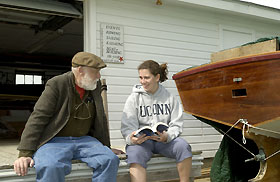For more archives, go to the Advance Archive/Search Page.
Maritime Studies Adopts Liberal Arts
Approach To Study Of Sea
Most historians have specialties with geographical borders. They focus on distinct areas such as France, Iran, Japan, Mozambique, or even ancient Mexico.
 |
Stephen Jones, professor of English, discusses a book with Cassandra Crandall, a junior, at the Avery Point campus. Jones, who teaches in the maritimate program, often holds classes at the boathouse.
Photo by Peter Morenus
|
Other historians focus on cultures, studying such topics as the Romans, the Mayans, Native Americans, Asians, or the Incas.
And then there is Helen Rozwadowski, hired last fall as an assistant professor of history at the Avery Point campus.
Her specialty has no borders, no one specific culture, not even a single government. Instead, her work focuses on the ocean as an international environment, known as much through science and technology as through maritime work, imagination, and cultural preconception.
"The perspective is much different than it would be if we were looking at land units," she says. "It involves both the romance of setting sail and the literature that explores the maritime world, as well as the science and economics that arise from the extraordinary complexity of tackling environmental resources issues and producing scientific knowledge about an international environment."
Hired to head the new maritime studies program, approved last September by the state Board of Higher Education, Rozwadowski says Avery Point is the perfect place to study the ocean. It is surrounded on three sides by water - Long Island Sound, the Thames River, and an estuary. It is also home to the National Undersea Research Center and the Connecticut Sea Grant College Program, and is close to Mystic Seaport, the New London Maritime Museum, the Mashantucket Pequot Museum, the Nautilus Submarine Museum, and the Center for Exploration at Mystic Aquarium, all of which will be used by students in the program.
"Water covers more than two-thirds of the earth's surface and the majority of the human population lives within 50 miles of navigable waterways," she says. "The world's oceans have provided the dominant medium for human economic and cultural exchange, and the context for many of humanity's most dramatic stories, powerful technologies, and sublime aesthetic and literary achievements.
Rozwadowski, the author of The Sea Knows No Boundaries: A Century of Marine Science Under ICES (International Council for the Exploration of the Sea), and editor of the Machine in Neptune's Garden: Historical Perspectives on Technology and the Marine Environment, has also worked as a public historian for Encyclopaedia Britannica, Discovery On-line, and the International Council for the Exploration of the Sea. She came to UConn from the Georgia Institute of Technology. She has won several history prizes, including the William E. and Mary B. Ritter Fellowship from the Scripps Institution of Oceanography in 2000.
The maritime studies program, which will recruit up to 25 students a year, adopts a classic liberal arts approach to the study of the sea and focuses on courses in five core areas: English, history, economics, political science, and anthropology. Coursework will be supplemented with internships and hands-on experiences. Students may choose to work at Mystic Seaport, or with Niantic Main Street, a community group, working to improve public access to the waterfront and bay in Niantic. Alternatively, they can spend three weeks this summer in Portugal, studying and completing an internship in animal husbandry working with sea lions, seals, and birds on the Algarve Coast.
"Experiential education is very important to our program," Rozwadowski says. "We are committed to integrating many different kinds of experiences into the curriculum, so that we can take an interdiscipl inary look at the human relationship with the maritime world."
A veteran of the Sea Education Association Semester, a program that allows students to study oceanography, nautical science, and maritime literature and history aboard a schooner out of Woods Hole, Mass., Rozwadowski is hoping students will incorporate big ship experience into their educational program as well.
"The ideal is for students to share responsibility for their own education, to step forward and be willing to be challenged," she says.
The maritime studies program is one of three four-year programs Avery Point offers for undergraduates. The others include the coastal studies program, which is science-based, and the American studies program, approved last October.
Core courses for maritime studies students include Literature of the Sea; an introductory course named after Rachel Carson's book The Sea Around Us; a course on the social and cultural history of seafaring; a course in the economics of the ocean; and a course in maritime law. Then, after students pursue a disciplinary specialty within liberal arts, they will spend a "capstone semester" working on a special research project, such as the politics and economics of fisheries, or cultural perspectives concerning Long Island Sound.
Students who graduate from the program may choose careers in public policy areas, journalism, port or harbor management, coastal town planning, public history, or community development, or may pursue a law degree or graduate study in environmental studies or marine affairs.
"The program is uniquely suited to our campus," says Rozwadowski, "and offers students a chance to confront new ideas, to question and refine their thoughts, and to begin building an understanding of the complex relationships between people and the oceans, relationships that cannot be fully explored through a single academic discipline."

